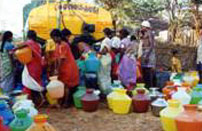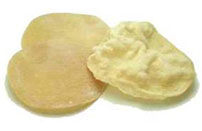will be updated soon
AWARDS & HONOURS
-
Karma Verar Kamarajar Award for 2003-2004 for ENVIRONMENTAL
MANAGEMENT, 2004
-
Outstanding Social Scientist/ Scientist: Science and Society
award to
Dr.T.M. Vatsala, 2002
-
Bio-Hydrogen -Best Research Paper Award; World Renewable
Energy Congress-VII Cologne, Germany, 2002
-
WIPO-World Intellectual Property Organisation Awad for
Invention, 1995.
-
Dr. Sheel Memorial Lecture Award, Indian Academy of Sciences,
Allahabad, 1992.
-
NRDC - President of India Award, 1991.
-
Indira Priyadarshini Vrikshamitra Award for Environment, 1990,
-
B D Tilak Award of Indian National Science Academy,1986.
-
Kasturi Ranga Memorial Award, 1983.
-
Jamnalal Balaji Awards for S&T for Rural Development, 1981.
-
WIPO-World Intellectual Property Organisation Awards for
Invention, 1981.
-
NRDC President of India Awards, 1979.
The Recognition
-
Spin Offs - Aiding growth through synergy
-
The Waves - Specialists in fish aggregating devices.
-
The Murugappa Shelter Trust - Alternative housing
solution providers.
-
Shaktha Society for Women - Women related issues.
-
Chennai-Dendro-Tech Pvt. Ltd.,- Turnkey land
developers.
-
Dr. C. V. Seshadri Resource Centre for Rural Development
- Research & Development of new technologies for generating income
for the rural population.
-
Dr. C. V. Seshadri Smruti charitable Trust - Agency
that produces and markets Spirulina.
Well, ours is unending journey that has crossed several
milestones in these 30 years.
Looking back, we are satisfied of our role in converting
technologies into tangible benefits for people. And looking ahead,
We feel confident of taking on further challenges.
We shall march forward into the future breaking new ground in
every venture we enter into.
NGOs Directory
MCRC has compiled a directory on voluntary organisations
working in Tamil Nadu on behalf of CAPART, Hyderabad,
and Development Alternatives (DA), New Delhi.
CAPART requires this information to disseminate its activities through
networking while DA plans to list them into the Internet.
Community Development Works
Workshops and Training Programmes
Under
the aid of government agencies many workshops and training programmes are being
conducted in MCRC on several technologies developed by the Centre. The target
groups who are benefited from such training programmes are NGOs, Industries,
individuals and farmers.
Many of the MCRC's proven technologies are being transferred
to rural areas for income generation. Apart from these programmes, many camps
on environmental awareness and health care are also being conducted at the
Centre.
Energy Surveys/Studies
MCRC has carried out pioneering studies in several rural areas,
in particular, in the isolated regions of the Lakshadweep Islands, The Nilgiri Hills, The
Kumaon Hills in the Himalayas, etc. Expertise has been
established at MCRC for the optimal use of the renewable resources in these
areas.
Plantation
crops for energy; especially the cultivation of Casuarina equisetifolia to
develop wastelands is an important area of activity. MCRC has also been
involved in developing simple adaptable techniques in the energy sector that
could be dovetailed to any simple need.
Screen Printing
Screen printing The screen printing technique developed
at MCRC was not only conceived of as a programme for income generation for
women but also to provide more avenues for the trade by screen printing on
cloth. Cloth as a medium of communication can also decrease environmental
pollution. The training programme at villages near Avadi, Chennai led to
setting up of two such functional units. Many more training programmes on
screen printing are envisaged.
Sustainable fresh water supply to Chennai
city
 A mammoth fresh water crisis waits future generation in
India.
The crisis will not be due to the lack of fresh water as such, but the
availability of adequate
quality water at the right places and required time to meet basic needs. The
emerging global fresh water crisis is already visible in India,
involving enormous social, political and environmental costs, which are
affecting the economy and quality of life. A mammoth fresh water crisis waits future generation in
India.
The crisis will not be due to the lack of fresh water as such, but the
availability of adequate
quality water at the right places and required time to meet basic needs. The
emerging global fresh water crisis is already visible in India,
involving enormous social, political and environmental costs, which are
affecting the economy and quality of life.
The fresh water crisis is not just the result of natural
factors such as drought, but has been caused by humans, by increased pollution
of both surface and ground water, improper water resource management, and the
shortcomings in the design, and implementation of legislation and regulations
which address these problems.
The objective of the study was to provide insights for
policies and programmes on fresh water management in India
through an analysis of the trends in water availability and its use at the
local level.
MCRC undertook such a study for the Chennai water basin.
The intention was to examine the water situation and approaches being used by
people at the urban areas, in order to achieve an assured supply of household
water and utilise it for productive activities with related impacts on the
ecosystem.
The insights were used in a synthesis report to suggest a
set of policy and programme recommendations aimed primarily
at the state and national level. This was carried out with
support provided by the UNICEF and WWF in India
TORBED survey
 A short term project entitled “TORBED Food Processing”
sponsored by Research ORTECH Inc., Canada
was carried out. The study is focused on assessing the current practices in the
food processing industry. A baseline survey was conducted to gather information
on employment, gender, environment
and energy etc with the food processing units in Tamil Nadu and also to study
the influence on introducing Turbo machine in food processing units mainly for
reduced consumption of oils. The project was successfully completed in collaboration
with Dr. C.V. Seshadri Resource centre which carried out survey on Pappads. A short term project entitled “TORBED Food Processing”
sponsored by Research ORTECH Inc., Canada
was carried out. The study is focused on assessing the current practices in the
food processing industry. A baseline survey was conducted to gather information
on employment, gender, environment
and energy etc with the food processing units in Tamil Nadu and also to study
the influence on introducing Turbo machine in food processing units mainly for
reduced consumption of oils. The project was successfully completed in collaboration
with Dr. C.V. Seshadri Resource centre which carried out survey on Pappads.
|

